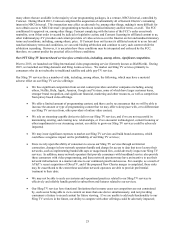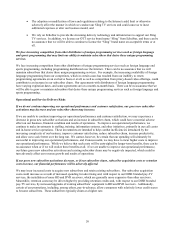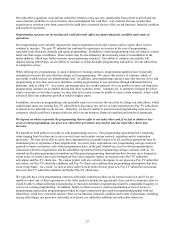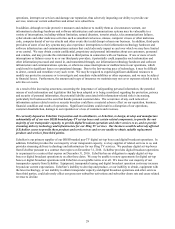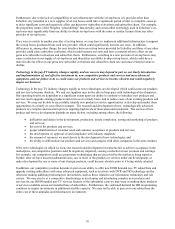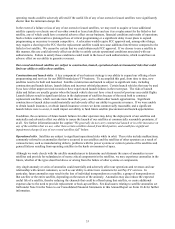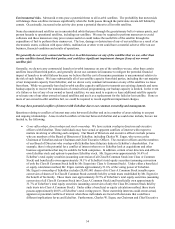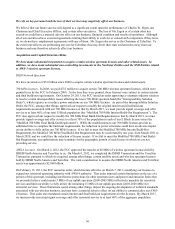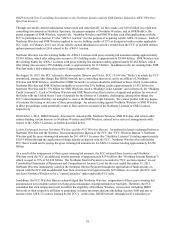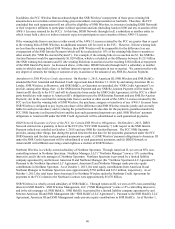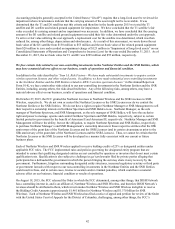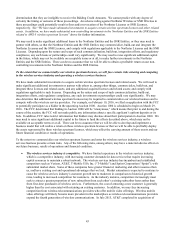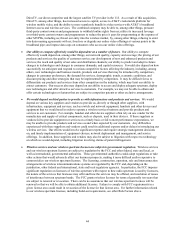Dish Network 2015 Annual Report Download - page 44
Download and view the complete annual report
Please find page 44 of the 2015 Dish Network annual report below. You can navigate through the pages in the report by either clicking on the pages listed below, or by using the keyword search tool below to find specific information within the annual report.34
Environmental risks. Meteoroid events pose a potential threat to all in-orbit satellites. The probability that meteoroids
will damage those satellites increases significantly when the Earth passes through the particulate stream left behind by
comets. Occasionally, increased solar activity also poses a potential threat to all in-orbit satellites.
Some decommissioned satellites are in uncontrolled orbits that pass through the geostationary belt at various points, and
present hazards to operational satellites, including our satellites. We may be required to perform maneuvers to avoid
collisions and these maneuvers may prove unsuccessful or could reduce the useful life of the satellite through the
expenditure of fuel to perform these maneuvers. The loss, damage or destruction of any of our satellites as a result of an
electrostatic storm, collision with space debris, malfunction or other event could have a material adverse effect on our
business, financial condition and results of operations.
We generally do not carry commercial launch or in-orbit insurance on any of the satellites that we use, other than
certain satellites leased from third parties, and could face significant impairment charges if any of our owned
satellites fail.
Generally, we do not carry commercial launch or in-orbit insurance on any of the satellites we use, other than certain
satellites leased from third parties, and generally do not use commercial insurance to mitigate the potential financial
impact of launch or in-orbit failures because we believe that the cost of insurance premiums is uneconomical relative to
the risk of such failures. We lease substantially all of our satellite capacity from third parties, including the vast majority
of our transponder capacity from EchoStar, and we do not carry commercial insurance on any of the satellites we lease
from them. While we generally have had in-orbit satellite capacity sufficient to transmit our existing channels and some
backup capacity to recover the transmission of certain critical programming, our backup capacity is limited. In the event
of a failure or loss of any of our owned or leased satellites, we may need to acquire or lease additional satellite capacity
or relocate one of our other owned or leased satellites and use it as a replacement for the failed or lost satellite. If one or
more of our owned in-orbit satellites fail, we could be required to record significant impairment charges.
We may have potential conflicts of interest with EchoStar due to our common ownership and management.
Questions relating to conflicts of interest may arise between EchoStar and us in a number of areas relating to our past
and ongoing relationships. Areas in which conflicts of interest between EchoStar and us could arise include, but are not
limited to, the following:
x Cross officerships, directorships and stock ownership. We have certain overlap in directors and executive
officers with EchoStar. These individuals may have actual or apparent conflicts of interest with respect to
matters involving or affecting each company. Our Board of Directors and executive officers include persons
who are members of the Board of Directors of EchoStar, including Charles W. Ergen, who serves as the
Chairman of EchoStar and our Chairman and Chief Executive Officer. The executive officers and the members
of our Board of Directors who overlap with EchoStar have fiduciary duties to EchoStar’s shareholders. For
example, there is the potential for a conflict of interest when we or EchoStar look at acquisitions and other
business opportunities that may be suitable for both companies. In addition, certain of our directors and officers
own EchoStar stock and options to purchase EchoStar stock. Mr. Ergen owns approximately 30.4% of
EchoStar’s total equity securities (assuming conversion of all Class B Common Stock into Class A Common
Stock) and beneficially owns approximately 39.1% of EchoStar’s total equity securities (assuming conversion
of only the Class B Common Stock held by Mr. Ergen into Class A Common Stock). Under either a beneficial
or equity calculation method, Mr. Ergen controls approximately 51.6% of the voting power of EchoStar.
Mr. Ergen’s ownership of EchoStar excludes 20,883,001 shares of its Class A Common Stock issuable upon
conversion of shares of its Class B Common Stock currently held by certain trusts established by Mr. Ergen for
the benefit of his family. These trusts own approximately 22.5% of EchoStar’s total equity securities (assuming
conversion of all Class B Common Stock into Class A Common Stock) and beneficially own approximately
31.7% of EchoStar’s total equity securities (assuming conversion of only the Class B Common Stock held by
such trusts into Class A Common Stock). Under either a beneficial or equity calculation method, these trusts
possess approximately 40.0% of EchoStar’s total voting power. These ownership interests could create actual,
apparent or potential conflicts of interest when these individuals are faced with decisions that could have
different implications for us and EchoStar. Furthermore, Charles W. Ergen, our Chairman and Chief Executive



